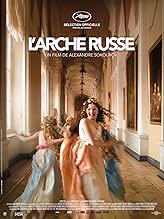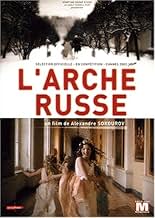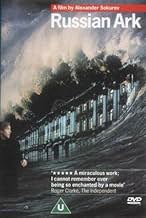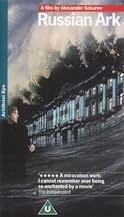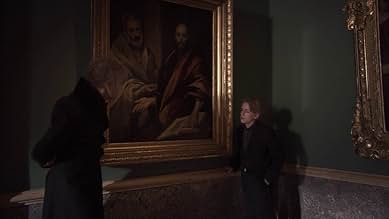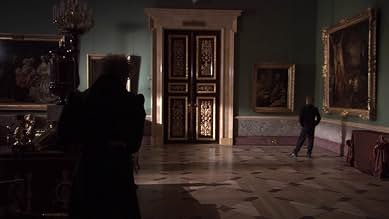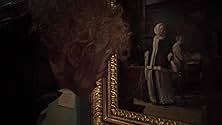Un aristócrata francés del siglo XIX, conocido por sus mordaces memorias sobre la vida en Rusia, viaja a través del Museo Estatal del Hermitage de Rusia y se encuentra con personajes históri... Leer todoUn aristócrata francés del siglo XIX, conocido por sus mordaces memorias sobre la vida en Rusia, viaja a través del Museo Estatal del Hermitage de Rusia y se encuentra con personajes históricos de los últimos 200 años.Un aristócrata francés del siglo XIX, conocido por sus mordaces memorias sobre la vida en Rusia, viaja a través del Museo Estatal del Hermitage de Rusia y se encuentra con personajes históricos de los últimos 200 años.
- Dirección
- Guionistas
- Elenco
- Premios
- 10 premios ganados y 15 nominaciones en total
Opiniones destacadas
I was drawn to this film as I have recently had to install digital television in my house (just for 24!) and I figured that I might as well see what the channels had to offer. After working out that I had access to numerous shopping channels I also found that I had BBC4, the arts and history channel, and that it was to be showing this film. I was interested in it not for my love of Russian history but for the fact that it was done in one take and, for that reason, I quite enjoyed it.
As far as plot goes, I really think you need to have an existing knowledge of Russian history as this film will not help you understand anything about it other than a passing impression. This was the case for me as I know next to nothing of the history, but I was still able to gleam some things about the political relationships between Russia and Europe as well as some of the main players. However it never got to the point where I was taken or engaged by the material; interested is perhaps a more fitting word to use - and that's still a good thing.
Technically the film is gripping and very impressive. Much was made of Snake Eye's 20 minute one-take opening (even thought it was actually 3 takes) or Goodfella's seamless move from street to table, but this film blows them away. I cannot even imagine the sheer logistics involved in creating such an effect. It would be impressive if the film was all shot in one room with a few cast members, but this film moves around the museum with a cast of thousands and set pieces that vary from two people looking at paintings to a massive ballroom scene. I was held totally impressed by the whole film as the entire one take was delivered seamlessly, without flaw. For this reason the acting is impressive whether it is Dontsov's acerbic Frenchman or just some extra's - everyone had to get it right bang on time and they did.
Overall this film will be a masterpiece if you have a good working knowledge and understanding of Russian history. However even if you don't know that much (like me), the technical aspect of this film will impress you no end even if the material is best seen as `interesting' at best.
The film was obviously shot in one day, but the cast and crew rehearsed for months to time their movements precisely with the flow of the camera while capturing the complex narrative, with elaborate costumes from different periods, and several trips out to the exterior of the museum. Tillman Buttner, the director of photography, was responsible for capturing it all in one single Steadicam shot. "Russian Ark" is an amazing accomplishment, and clearly made with passion, but while the film is sure to be hailed as a masterpiece by some, its narrative conceit isn't nearly as interesting as the technical feat of its creation. The result is a unique and intelligent film with sporadic moments of transcendent beauty that fails to create a strong emotional connection with its audience. It's essentially a 96-minute museum tour, with the added benefit of time travel and wax figures that briefly come to life.
But wax figures are all they are, essentially. Sokurov, as though following a hasty guide, spends so little time with the historical figures he portrays that it often feels as though he's moving on just as you begin to figure out who and what you're watching. The Russian experience of World War II, for example, is portrayed with a brief stop in a foreboding, ghostly room filled with coffins. The filmmaker is known for his lugubrious pacing, but Russian Ark has the odd distinction of seeming both slow paced and rushed. It moves slowly and mournfully, but still only glances across the surface of the eras it portrays. It's a demanding film, encompassing a wealth of Russian history and art history between its first and final frames. Those who stay with it will be rewarded in the end by a gorgeously mounted ball, in which the camera gracefully slides among elaborately costumed dancers as the orchestra plays. It's a deeply felt irony that this transcendent moment of joy takes place on the eve of the Russian revolution, and the world of these briefly glimpsed characters is about to come crashing to an end. It's a shame that the film has few moments where form and content align so powerfully
Not knowing a lot of Russian history, some of the scenes didn't make much sense, but I did cotton on to Anastasia being late for tea. Maybe she got away after all. There was nothing from the Soviet era, except a brief scene during the German siege of Lenningrad (a million died, mainly from starvation, and many made coffins for themselves before they expired). This seems appropriate, since the communists contributed nothing to the buildings, which were started by Peter the Great and added to by his successors. A bad fire in 1837 was followed by extensive reconstruction and many of the rooms we see in the film date from that time.
I suppose this is the first film in which the set is the star and the actors merely props. There is in fact one dramatic part, that of the French Marquis who attended the Tsar's court in the 1840s, and who is somehow able to take us backward and forward in time. Even he is a bit two-dimensional, in fact the other, unseen, presence (the voice of the director of the film) is as real.
Towards the end we attend a great ball, and the Marquis gets to dance the Marzurka again. The music is great (is that Glinka conducting something of this own?) and the atmosphere gay (as somebody says `you can't be shy for the Mazurka') and for a moment history is forgotten. But we don't have a plot, the characters are cut-outs (with the exception of Catherine who seems to have been one of the more boisterous Empresses in history) and, basically, nothing happens. Yet I found myself absorbed by it all, occasionally wishing I could click my mouse to zoom in on an interesting painting. Ironically, much of the art is non-Russian, so `Russian Ark' is something of a misnomer `Euro-Ark' is nearer the mark. At the end of the day, though, I am lost with admiration for the cinematographer, who managed to keep his digital camera running and pointed in the right direction for 90 minutes without making a mistake. Madness, brilliant Russian madness.
It would have been enough that the director got extensive access to the Hermitage Museum in Petersburg to show it to us.
It would have been enough to have authentic costumes, choreography, and make-up for several centuries of Russian history. (I was reminded that my husband's grandmother was a young seamstress for rich folks like these, making this extravagant lifestyle possible.)
It would have been enough to have literally a cast of thousands because how else can one really know how those fantastic ballrooms and grand staircases were meant to be used and seen without a full orchestra and gowned and uniformed participants as far as the camera can see?
It would have been enough to come up with a cute gimmick of a time-traveling two-some to glide us through the rooms of the Hermitage to show the tsars, aristocrats, curators, and ordinary Russian tourists who have passed through over the years, with humorous commentary on Russia's changing relationship with Europe over these centuries as shown through the art and architecture of the building while wars and revolutions loomed outside.
But then, it would have been enough that it's all done in a single take over just an hour and a half with luscious cinematography.
There was a slow line to get in the theater so I missed the opening historical background, and I've learned most of my Russian (let alone European) history from novels and movies so I did get a bit lost here and there wandering the corridors of history, but the unseen narrator posits that this is all a dreamscape anyway.
I made a point of seeing this because a fellow cinephile who I frequently bump into at my local arthouse had directly called the distributor asking when it would be playing elsewhere and was told they can't afford to make more prints available so one can only see it at the Manhattan theaters -- so make a point to see it on a movie screen and not just wait for when the History Channel shows a reduced version.
The film begins in the dark with the narrator (apparently Sokurov) commenting about how little he sees. "My eyes are open", he says, "and yet I see nothing". He does not know where he is but apparently has just died in an accident of some kind. Is this a movie? A play?" he asks. He receives no answer except a vision of 18th century aristocrats moving slowly into the Tsar's palace. An elegant white-haired man in a black cloak (Sergey Dreiden) suddenly appears and escorts the confused narrator into the corridors of the grand palace. "Everyone knows the present, but who can remember the past", says the stranger as they walk from one ballroom to the next, witnessing great works of art as well as ghost-like presences from Russia's past. We see works by El Greco, Rubens and Van Dyck in their awesome splendor. We run into Peter the Great thrashing a general, Catherine the Great looking for the bathroom, and Nicholas II, the last Russian Tsar hosting the Great Royal Ball of 1913, the last such formal occasion of its kind.
As we enter the Great Nicholas Hall, the opulent room is filled with thousands of aristocrats dancing the mazurka in gorgeous period costumes. A full orchestra is playing in the background and young soldiers are nattily dressed in their uniforms. How beautiful it all seems and how it appears they were destined to live forever but we all know how the nasty Bolsheviki spoiled the party. Ah yes, how green was my valley then. Sokurov said he wanted to make a whole film "in one breath" and he has succeeded in simulating the breathing process, pulling us in, then moving us out as we feel the rhythm of our own life beating with the swirl of lost humanity. At the end of Russian Ark, we see the peaceful flow of a river outside the hall to which the narrator comments, "The flow is forever. Life is forever." Having completed the past, our invisible guide is now ready to move into the endless silence that is, in the phrase of the Anglican priest Thomas Kelly, "the source of all sound".
¿Sabías que…?
- TriviaShot in a single take. The first three attempts were cut short by technical difficulties, but the fourth was successful.
- ErroresMany extras look to the camera and they quickly return to a default mark.
- Citas
The Time Traveller: Sir. Sir. A pity you're not here with me. You would understand everything. Look. The sea is all around. And we are destined to sail forever, to live forever.
- ConexionesEdited into Spisok korabley (2008)
- Bandas sonorasMazurka
(from opera "A Life For The Tsar")
Music by Mikhail Glinka
Performed by Mariinsky Theatre Orchestra
Conducted by Valery Gergiev
Selecciones populares
- How long is Russian Ark?Con tecnología de Alexa
Detalles
- Fecha de lanzamiento
- Países de origen
- Idiomas
- También se conoce como
- Russian Ark
- Locaciones de filmación
- Productoras
- Ver más créditos de la compañía en IMDbPro
Taquilla
- Total en EE. UU. y Canadá
- USD 3,048,997
- Fin de semana de estreno en EE. UU. y Canadá
- USD 29,022
- 15 dic 2002
- Total a nivel mundial
- USD 8,691,860
- Tiempo de ejecución
- 1h 39min(99 min)
- Color
- Mezcla de sonido
- Relación de aspecto
- 1.78 : 1






